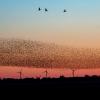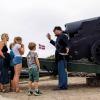
Haderslev Festival of Light celebrates Denmark’s liberation
Ever since the news of Denmark’s liberation was announced on the radio on the evening of 4th May 1945, candlelight has been an integral part of the celebration of this event. In many Danish homes it’s still a tradition to place lighted candles in the windows on this particular evening.
In Haderslev the celebration has an extra and much greater dimension in the form of the Haderslev Festival of Light.
The Festival of Light dates back to 1950, when Colonel Gabel-Jørgensen decided to take matters into his own hands when he learned that there would be no official celebration of 4th May. At very short notice, he organised an event at the barracks in Haderslev that included hoisting of the Danish flag, speeches and 400 candles being lit in the windows of the barracks. To the Colonel’s great surprise, more than 2,000 people attended the event, which has taken place ever since.
This year, hundreds of candles will thus be lit at the barracks on the evening of 4th May, while thousands of people will gather to listen to the original recording of the news of the liberation, to see candles being lit in the windows of the barracks, to listen to the speeches and to join in the community singing. During recent years there has also been a special light event.
Haderslev Festival of Light is much more than a beautiful and moving event at the barracks, however. In 2014 the barracks and the municipal council in Haderslev began collaboration on a renewal of the festival of light, which today encompasses a number of other events that all touch on the main themes of the festival – peace, freedom and reconciliation.
The programme for the Festival of Light is made up of debates, lectures, exhibitions, music, film and theatre. The plethora of events focuses not only on historical events, but also on security and political issues that are relevant today.
Haderslev Festival of Light attracts around 10,000 visitors, and is therefore one of the country’s biggest celebrations to commemorate Denmark’s liberation at the end of the Second World War.

